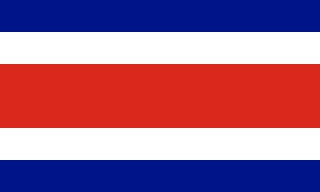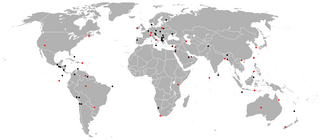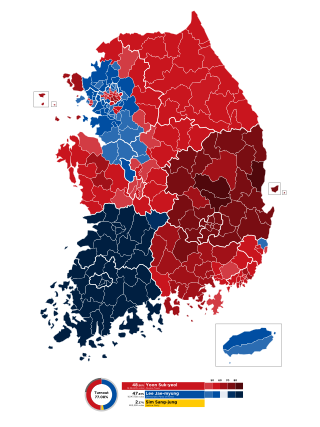An election exit poll is a poll of voters taken immediately after they have exited the polling stations. A similar poll conducted before actual voters have voted is called an entrance poll. Pollsters – usually private companies working for newspapers or broadcasters – conduct exit polls to gain an early indication as to how an election has turned out, as in many elections the actual result may take many hours to count.

Presidential elections were held in South Korea on 19 December 2002. The result was a victory for Roh Moo-Hyun of the ruling Millennium Democratic Party, who defeated Lee Hoi-chang of the Grand National Party by just over half a million votes.

Costa Rica competed at the 2000 Summer Olympics in Sydney, Australia. The nation bagged two bronze medals at the 2000 Games.

Park Geun-hye is a South Korean politician who served as the 11th president of South Korea from 2013 to 2017.

Costa Rica competed at the 1996 Summer Olympics in Atlanta, United States. Claudia Poll won the nation's first ever gold medal. This was Costa Rica's second Olympic medal in 10 Olympic appearances. The only previous one, a silver medal, was won by Claudia's sister Silvia Poll at the 1988 Summer Olympics in Seoul, South Korea.

Presidential elections were held in South Korea on 19 December 2007. The election was won by Lee Myung-bak of the Grand National Party, returning conservatives to the Blue House for the first time in ten years. Lee defeated Grand Unified Democratic New Party nominee Chung Dong-young and independent Lee Hoi-chang by a nearly 2-to-1 margin, the largest since direct elections were reintroduced in 1987. It also marked the first time a president-elect in Korea was under investigation by a prosecutor. Voter turnout was 63.0%, an all-time low according to the National Election Commission.

Anti-Japanese sentiment in Korean society has its roots in historic, cultural, and nationalistic sentiments.

New 7 Wonders of Nature (2007–2011) was an initiative started in 2007 to create a list of seven natural wonders chosen by people through a global poll. It was the second in a series of Internet-based polls led by Swiss-born Canadian Bernard Weber and organized by the New 7 Wonders Foundation, a Swiss-based foundation which Weber founded. The initiative followed an earlier New 7 Wonders of the World campaign, and attracted 100 million votes from around the world before voting finished on November 11, 2011.

The Grand Unified Democratic New Party was a political party of South Korea. It was formed out of the Uri Party and its resulting splinter groups. Chung Dong-young was the party's candidate in the 2007 South Korean presidential election; he lost to Lee Myung-bak. On February 17, 2008, the party merged with the Democratic Party to form the United Democratic Party.

Legislative elections were held in South Korea on 13 April 2000.

Relations between Canada and the Democratic People's Republic of Korea are very limited, as Canada suspended full diplomatic relations in 2010 over North Korea's destabilizing nuclear activity. Travel and commerce with North Korea are discouraged by the Canadian government and there is very little trade or diplomatic contact due to Canada's perspective that North Korea plays a destabilizing role in the Asia Pacific region.

Legislative elections were held in South Korea on 11 April 2012. The election was won by the ruling Saenuri or New Frontier Party, which renewed its majority in the National Assembly, despite losing seats. The election was read as a bellwether for the presidential election to be held later in the year. The result confounded exit polls and media analysis, which had predicted a closer outcome.

Presidential elections were held in South Korea on 19 December 2012. They were the sixth presidential elections since democratization and the establishment of the Sixth Republic, and were held under a first-past-the-post system, in which there was a single round of voting and the candidate receiving the highest number of votes was elected. Under the South Korean constitution, a president is restricted to a single five-year term in office. The term of the then incumbent president Lee Myung-bak ended on 24 February 2013. According to the Korea Times, 30.7 million people voted with turnout at 75.8%. Park Geun-hye of the Saenuri party was elected the first female South Korean president with 51.6% of the vote opposed to 48.0% for her opponent Moon Jae-in. Park's share of the vote was the highest won by any candidate since the beginning of free and fair direct elections in 1987 and the first such election in which any candidate won a majority. Moreover, as of the 2022 election, this is the latest South Korean presidential election in which the winning candidate won an absolute majority of the vote.

Early presidential elections were held in South Korea on 9 May 2017 following the impeachment and removal of Park Geun-hye. The elections were conducted in a single round, on a first-past-the-post basis, and had originally been scheduled for 20 December 2017. However, they were brought forward after the decision of the Constitutional Court on 10 March 2017 to uphold the National Assembly's impeachment of Park. Following procedures set out in the Constitution of South Korea, Prime Minister Hwang Kyo-ahn succeeded Park as the acting president. After Park was removed from office by the Constitutional Court's ruling, acting president Hwang announced he would not run for a term in his own right.

Legislative elections were held in South Korea on 13 April 2016. All 300 members of the National Assembly were elected, 253 from first-past-the-post constituencies and 47 from proportional party lists. The election was an upset victory for the liberal Democratic Party, which defied opinion polling by winning a plurality of seats in the election and defeating the ruling conservative Saenuri Party by one seat. In votes for party lists, however, Democratic Party came third, behind the Saenuri Party in first place and the new People Party in second.

Korea has had a long history of both resistance against and subordination to Imperial China. Until the onset of Western imperialism in the 19th century, Korea had been part of the sinocentric East Asian regional order.

Legislative elections were held in South Korea on 15 April 2020. All 300 members of the National Assembly were elected, 253 from first-past-the-post constituencies and 47 from proportional party lists. They were the first elections held under a new electoral system. The two largest parties, the liberal Democratic Party and the conservative United Future Party, set up new satellite parties to take advantage of the revised electoral system. The reforms also lowered the voting age from 19 to 18.

Presidential elections were held in South Korea on 9 March 2022. Under the South Korean constitution, presidents are restricted to a single five-year term, meaning that incumbent president Moon Jae-in was ineligible to run for a second term. Opposition candidate Yoon Suk Yeol of the People Power Party won the election, defeating candidate Lee Jae-myung of the incumbent Democratic Party.
Gallup Korea (Korean: 한국갤럽) or Gallup Korea Research Institute (Korean: 한국갤럽조사연구소) is a South Korean research company. Founded by Park Moo-ik in 1974, the company became a member of Gallup International Association in 1997. It is best known for conducting public surveys on political, entertainment, sports, as well as on social subjects.